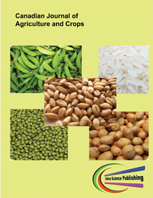Evaluation of Palm Oil Mill Effluent (POME) Impact on Soil Chemical Properties and Weed Cover in Awka–Rain Forest Zone of Nigeria
DOI:
https://doi.org/10.20448/803.4.2.93.100Keywords:
Cowpeacultivars, POME, Weed score/weight, Lit/ha, C/N ratio, Exchangeable bases.Abstract
A factorial experiment fitted into a randomized complete block design was used to test the impact of POME on some soil chemical parameters and weed cover at the Nnamdi Azikiwe University Awka Teaching and Research Farm. POME levels of 8000l/ha,6000l/ha,4000l/ha and 0l/h(control) were applied on the plots after which three cultivars of cowpea were planted(Dan Kano, Bornu local and Sokoto local). During the course of the work, increasing the level of POME application increased the soil pH. At 8000l/ha the soil was slightly alkaline (9.5) and (8.1) during wet and dry seasons respectively.Exchangeable bases like calcium and potassium also increased with increase in POME rates. But there was a slight decrease in total nitrogen and C/N ratio in both seasons with increase in POME rates.On weed infestation,the control plots had the largest weed score(3.5) and weed weight (670.45g/m2) in rainy season while 8000l/ha plots had the least weed score(2.0) and weed weight (170.73g/m2) also in rainy season. This work showed that POME,an organic waste can be effectively and safely applied on farm lands at rate of up to 8000l/ha especially if cowpea is to be planted notably Sokoto local which gave the highest yields (0.3 and 0.24t/ha)in rainy and dry seasons respectively.


